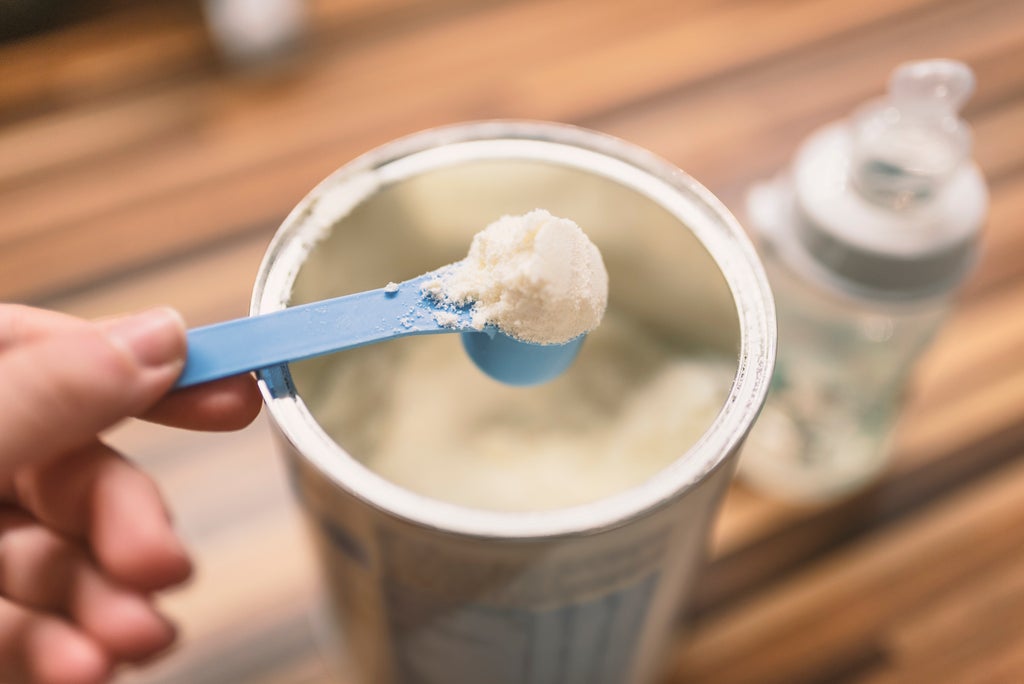
Large retailers across the US have begun rationing baby formula after a recall and supply chain issues caused shortages.
In February, the US Food and Drug Administration (FDA) issued a warning to consumers after baby formula manufacturer Abbott Nutrition recalled powdered formula, following reports that multiple babies had gotten sick with bacterial infections after consuming formula produced in its facility in Michigan.
In the FDA’s reported findings in March, it said that the formula maker failed to maintain sanitary conditions and procedures at its manufacturing plant. In addition to failing to maintain clean surfaces, FDA inspectors also reported finding a history of contamination with the bacteria cronobacter.
As a result of the recall, which affected certain Alimentum, EleCare, or Similac products, and ongoing supply chain issues, retailers including Walgreens, Target, CVS and Kroger have all begun rationing supplies of formula, according to the Wall Street Journal.
The rationing comes as an analysis by Datasembly, which analysed 11,000 sellers of baby formula in the country, found that baby formula brands hit out-of-stock per centages of 31 per cent in April 2022. The latest shortage findings mark an increase from 11 per cent nationwide in November.
“Inflation, supply chain shortages, and product recalls have brought an unprecedented amount of volatility for baby formula,” founder and CEO, Ben Reich, said. “We expect to continue to see the baby formula category being dramatically affected by these conditions. Baby formula stock has been one of the more affected categories so far in 2022, and one that will continue to demonstrate higher than average out-of-stock levels.”
According to Datasembly, the states experiencing the worst shortages are Connecticut, Delaware, Montana, New Jersey, Rhode Island, Texas, and Washington, where formula shortages were higher than 40 per cent during the week of 3 April.
In Des Moines, Iowa, Minneapolis, Minnesota, and San Antonio, Texas, the out-of-stock per centages were even higher, with the metropolitan areas found to be experiencing per centages of 50 per cent, 55 per cent, and 56 per cent, respectively.
This is what the ration means in each store, and what manufacturers are doing to remedy the situation.
How many units of baby formula can customers currently purchase from the retailers?
In a statement to The Independent, a spokesperson for Walgreens said that increased demand and “various supplier challenges” have resulted in constraints for formulas across the country.
“Similar to other retailers, we put into effect purchase limits of three per transaction on all infant and toddler formula to help improve inventory. We continue to work diligently with our supplier partners to best meet customer demands,” the company said.
According toThe Washington Post, the same limit is currently in place by CVS, which is rationing purchases online and in stores to three units.
Target also confirmed to The Independent there are currently online product limitations in place for the formula, and said it is monitoring the country-wide shortage to ensure that the formula is available for its customers. According to The Washington Post, online purchases of baby formula from Target are limited to four orders per customer, while the Wall Street Journal reported Kroger is also rationing formula.
When will the supplies of baby formula return to normal?
In a statement to The Washington Post, a spokesperson for Abbott said that the manufacturer is doing everything it can to remedy the situation.
“We know that this recall has further exacerbated an industry-wide infant formula supply shortage. We are doing everything we can to address it,” Abbott said, adding that it has increased production of Similac and is working with health providers to help consumers find alternatives.
However, even with manufacturers ramping up production, the shortages are likely to last a few weeks, according to Brian Dittmeier, the senior director of public policy for the National WIC Association, who told USAToday “we will probably continue to see shortages in the next couple of weeks”.
“But our hope is that as production ramps up, that later this spring it should be easier for families across the country,” he added.
What can consumers facing shortages do?
Experts are recommending that parents reach out to their child’s paediatrician if they are struggling to find a certain baby formula, to determine whether there are suitable alternatives.
According to Dr John Kunzer with Community Health Network, who spoke to WTHR, parents can switch brands as long as they continue using the same type of formula.
However, he warned that parents should not try to extend the amount of formula by adding water and diluting the product.
According toGood Morning America, baby formula should never be diluted, as it can lead to health issues and be life-threatening for babies.
The Independent has contacted Abbott, CVS and Kroger for comment.





